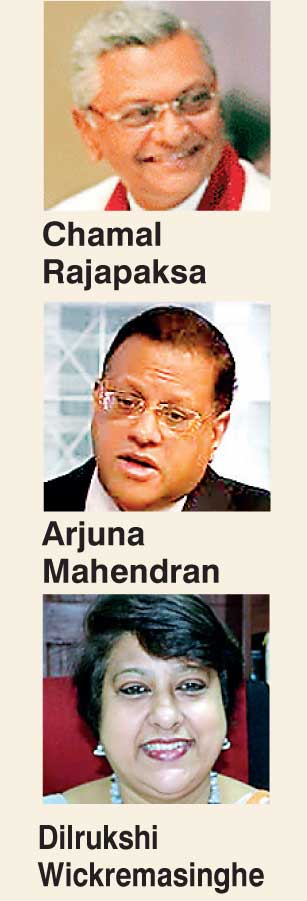Thursday Feb 19, 2026
Thursday Feb 19, 2026
Thursday, 21 May 2015 01:18 - - {{hitsCtrl.values.hits}}
 Says public servants deserve fair trial; suggests Parliament can refer matter to select committee
Says public servants deserve fair trial; suggests Parliament can refer matter to select committee
Speaker Chamal Rajapaksa yesterday turned down the Opposition’s request to pass no-confidence motions against Central Bank Governor Arjuna Mahendran and Bribery Commission Director General Dilrukshi Wickremasinghe.
In his verdict, the Speaker recommended presenting issues against Mahendran and Wickremasinghe to an existing parliamentary select committee or special select committee prior to a debate.
“An existing committee should conduct the initial investigation and the findings, along with the recommendations, should be debated in Parliament. Otherwise the allegations against the Central Bank Governor should be submitted to the COPE, allowing its Chairman to appoint a suitable committee to conduct an investigation. The findings of this committee should be reported to the Parliament within two weeks,” the Speaker said.
“Both (Mahendran and Wickremasinghe) are public officers and the motions are about their conduct. I believe Article 13 (3) of our Constitution is relevant and important. It says that any person charged with an offence is entitled to be heard, in person or by an attorney-at-law, at a fair trial by a competent court. This is based on the principles of natural justice. So the other party should be provided with a fair and equal opportunity to provide facts as given in the Audi Alteram Partem principle. Adding more to it, necessary room should be provided to investigate the matter in depth,” Rajapaksa added
“Prof. G.L. Peiris submitted the motion against the Central Bank Governor on 29 April 2015 which was endorsed by 88 Parliamentarians. MP Bandula Gunawardena submitted the motion against the Director General of the Bribery Commission on 21 April 2015 endorsed by 88 Parliamentarians. Both motions are listed in the Order Paper and seek an urgent debate,” Rajapaksa asserted.
“I have consulted both Prime Minister Ranil Wickremesinghe and Opposition Leader Nimal Siripala de Silva. The Leader of the House and the Minister of Plantation Industries Lakshman Kiriella said that entertaining the motion would set a bad example. Both the Minister of Justice Wijeyadasa Rajapakshe and Deputy Minister of Foreign Affairs confirmed this. However, I agreed to give my opinion on the matter to this House.
“Deputy Speaker Chandima Weerakkody suspended the Parliament yesterday on two occasions to control the unrest. Having met the committee I agreed to give my decision today (20 May). The motion Prof. Peiris submitted was included in the Order Paper 14 (1) on 8 May 2015 as a pending matter. Unless I rule it illegal on par with Standing Order 23 (3), such a motion should not be taken up for debate before five days have elapsed since its inclusion in the Order Paper. The motion against the Director General of the Bribery Commission was included in the Order Paper 14 on 30 April 2015,” he said.
The Speaker went on to state: “According to Article 4 of the Constitution, the legislative power of the people shall be exercised by Parliament, consisting of elected representatives of the People and by the People at a referendum. The Article 76 (1) says that Parliament shall not abdicate or in any manner alienate its legislative power and shall not set up any authority with any legislative power. Article 148 ensures Parliament’s full control over public finance. The recent 19th Amendment is also aimed at further strengthening Parliament and widening its monitoring power over the Executive. “According to Article 42 (2) of the 19th Amendment to the Constitution, the Cabinet is responsible and answerable to Parliament. Article 74 of the Constitution empowers Parliament to monitor matters in institutions, raise questions, question the officials at committees, inspect documents and investigate petitions. I feel Clause 3 of the Parliamentary Privileges Act is important and it provides members with the right to debate. So, I don’t agree that these two motions cannot be debated in the Parliament unless there are limitations made by Standing Orders. And especially a debate can be started about the persons covered under Article 78 of the Constitution.”